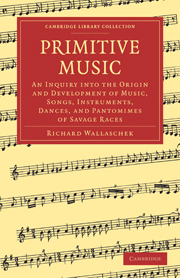 Primitive Music
Primitive Music Book contents
- Frontmatter
- PREFACE
- Contents
- CHAPTER I GENERAL CHARACTER OF THE MUSIC OF PRIMITIVE PEOPLE
- CHAPTER II SINGERS AND COMPOSERS IN PRIMITIVE TIMES
- CHAPTER III INSTRUMENTS
- CHAPTER IV THE BASIS OF OUR MUSICAL SYSTEM
- CHAPTER V PHYSICAL AND PSYCHICAL INFLUENCE OF MUSIC
- CHAPTER VI TEXT AND MUSIC
- CHAPTER VII DANCE AND MUSIC
- CHAPTER VIII PRIMITIVE DRAMA AND PANTOMIME
- CHAPTER IX ORIGIN OF MUSIC
- CHAPTER X HEREDITY AND DEVELOPMENT
- Summary
- List of quoted Authorities
- Index
- Plate section
CHAPTER IX - ORIGIN OF MUSIC
Published online by Cambridge University Press: 29 August 2010
- Frontmatter
- PREFACE
- Contents
- CHAPTER I GENERAL CHARACTER OF THE MUSIC OF PRIMITIVE PEOPLE
- CHAPTER II SINGERS AND COMPOSERS IN PRIMITIVE TIMES
- CHAPTER III INSTRUMENTS
- CHAPTER IV THE BASIS OF OUR MUSICAL SYSTEM
- CHAPTER V PHYSICAL AND PSYCHICAL INFLUENCE OF MUSIC
- CHAPTER VI TEXT AND MUSIC
- CHAPTER VII DANCE AND MUSIC
- CHAPTER VIII PRIMITIVE DRAMA AND PANTOMIME
- CHAPTER IX ORIGIN OF MUSIC
- CHAPTER X HEREDITY AND DEVELOPMENT
- Summary
- List of quoted Authorities
- Index
- Plate section
Summary
We have been told until tired of hearing it, that the one essential feature in primitive music was rhythm, melody being of accessory importance. We do not meet with a single instance among savages of melody, fixed according to musical principles; melodic cadences, where they occur, serve only as signals, or as a convenient accompaniment to certain activities, such as rowing, towing, or fighting. Even among savage tribes where some songs have in course of time become traditional, words and melody are varied after a few repetitions by different singers, or even by the same performer. Rhythm, taken in a general sense to include “keeping in time,” is the essence in music, in its simplest form as well as in the most skilfully elaborated fugues of modern composers. To recall a tune the rhythm must be revived first, and the melody will easily be recalled. The latter may be suggested by the former, but never vice versâ. Completely to understand a musical work ceases to be difficult when once its rhythmical arrangement is mastered; and it is through rhythmical performance and rhythmical susceptibility that musical effects are produced and perceived. From these several data I conclude that the origin of music must be sought in a rhythmical impulse in man. I do not mean that musical effects consist in rhythmical movement as such; innumerable ideas and feelings become associated with it, and give rise to those emotions which we on hearing it experience.
- Type
- Chapter
- Information
- Primitive MusicAn Inquiry into the Origin and Development of Music, Songs, Instruments, Dances, and Pantomimes of Savage Races, pp. 230 - 262Publisher: Cambridge University PressPrint publication year: 2009First published in: 1893
- 1
- Cited by


